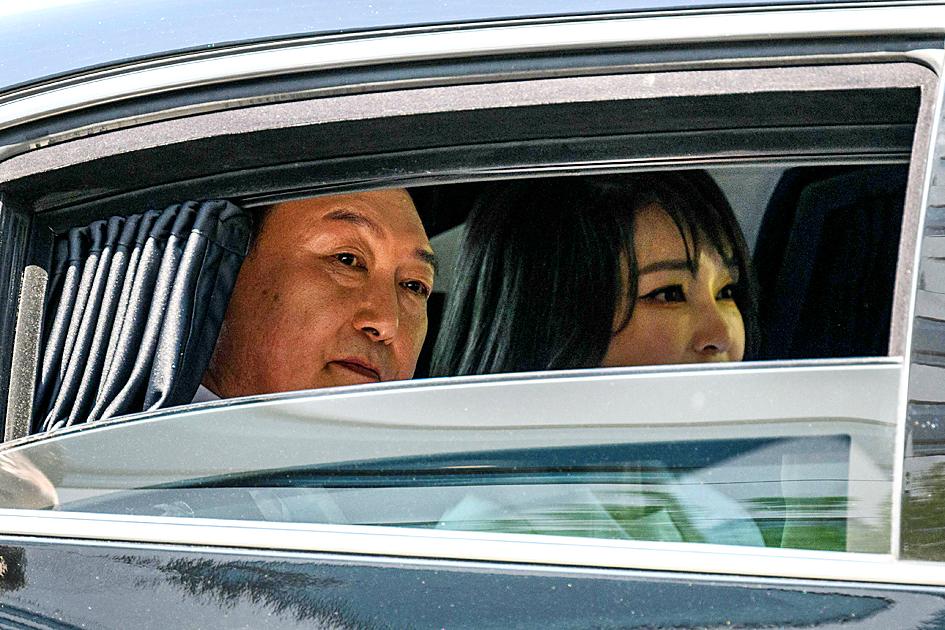South Korea’s new leader, Yoon Suk-yeol, yesterday called on the North to give up its nuclear weapons in exchange for massive economic aid, describing Pyongyang’s missiles as a threat to regional and global security.
Yoon, 61, who started work in an underground bunker with a briefing on North Korea, takes office at a time of high tensions on the Korean Peninsula, with Pyongyang conducting a record 15 weapons tests since January, including two launches last week.
The former prosecutor, who won the election by a razor-thin margin in March, said in his inaugural speech that he would consider sending transformative levels of economic aid to the North — but only if Pyongyang first gives up its nuclear weapons.

Photo: AFP
“If North Korea genuinely embarks on a process to complete denuclearization, we are prepared to work with the international community to present an audacious plan that will vastly strengthen North Korea’s economy and improve the quality of life for its people,” he said.
“While North Korea’s nuclear weapon programs are a threat not only to our security and that of Northeast Asia, the door to dialogue will remain open so that we can peacefully resolve this threat,” Yoon added.
However, the offer of “audacious” aid is a dud, analysts have said, as North Korea, which invests a vast chunk of its GDP into weapons, has long made it clear that it will not make such a trade.
The inauguration was held at Seoul’s National Assembly, with marching bands, soldiers in ceremonial dress and a 21-gun salute.
US President Joe Biden sent a high-profile delegation headed by Douglas Emhoff, husband of US Vice President Kamala Harris.
Japan and China also sent high-level representatives, with Yoon saying he wanted to mend sometimes fractious relations with regional powers.
“At a time when the rules-based international order is under threat, the strategic collaboration between Japan and South Korea ... is needed more than ever,” Japanese Minister of Foreign Affairs Yoshimasa Hayashi said after attending the inauguration.

AIR SUPPORT: The Ministry of National Defense thanked the US for the delivery, adding that it was an indicator of the White House’s commitment to the Taiwan Relations Act Deputy Minister of National Defense Po Horng-huei (柏鴻輝) and Representative to the US Alexander Yui on Friday attended a delivery ceremony for the first of Taiwan’s long-awaited 66 F-16C/D Block 70 jets at a Lockheed Martin Corp factory in Greenville, South Carolina. “We are so proud to be the global home of the F-16 and to support Taiwan’s air defense capabilities,” US Representative William Timmons wrote on X, alongside a photograph of Taiwanese and US officials at the event. The F-16C/D Block 70 jets Taiwan ordered have the same capabilities as aircraft that had been upgraded to F-16Vs. The batch of Lockheed Martin

GRIDLOCK: The National Fire Agency’s Special Search and Rescue team is on standby to travel to the countries to help out with the rescue effort A powerful earthquake rocked Myanmar and neighboring Thailand yesterday, killing at least three people in Bangkok and burying dozens when a high-rise building under construction collapsed. Footage shared on social media from Myanmar’s second-largest city showed widespread destruction, raising fears that many were trapped under the rubble or killed. The magnitude 7.7 earthquake, with an epicenter near Mandalay in Myanmar, struck at midday and was followed by a strong magnitude 6.4 aftershock. The extent of death, injury and destruction — especially in Myanmar, which is embroiled in a civil war and where information is tightly controlled at the best of times —

China's military today said it began joint army, navy and rocket force exercises around Taiwan to "serve as a stern warning and powerful deterrent against Taiwanese independence," calling President William Lai (賴清德) a "parasite." The exercises come after Lai called Beijing a "foreign hostile force" last month. More than 10 Chinese military ships approached close to Taiwan's 24 nautical mile (44.4km) contiguous zone this morning and Taiwan sent its own warships to respond, two senior Taiwanese officials said. Taiwan has not yet detected any live fire by the Chinese military so far, one of the officials said. The drills took place after US Secretary

THUGGISH BEHAVIOR: Encouraging people to report independence supporters is another intimidation tactic that threatens cross-strait peace, the state department said China setting up an online system for reporting “Taiwanese independence” advocates is an “irresponsible and reprehensible” act, a US government spokesperson said on Friday. “China’s call for private individuals to report on alleged ‘persecution or suppression’ by supposed ‘Taiwan independence henchmen and accomplices’ is irresponsible and reprehensible,” an unnamed US Department of State spokesperson told the Central News Agency in an e-mail. The move is part of Beijing’s “intimidation campaign” against Taiwan and its supporters, and is “threatening free speech around the world, destabilizing the Indo-Pacific region, and deliberately eroding the cross-strait status quo,” the spokesperson said. The Chinese Communist Party’s “threats